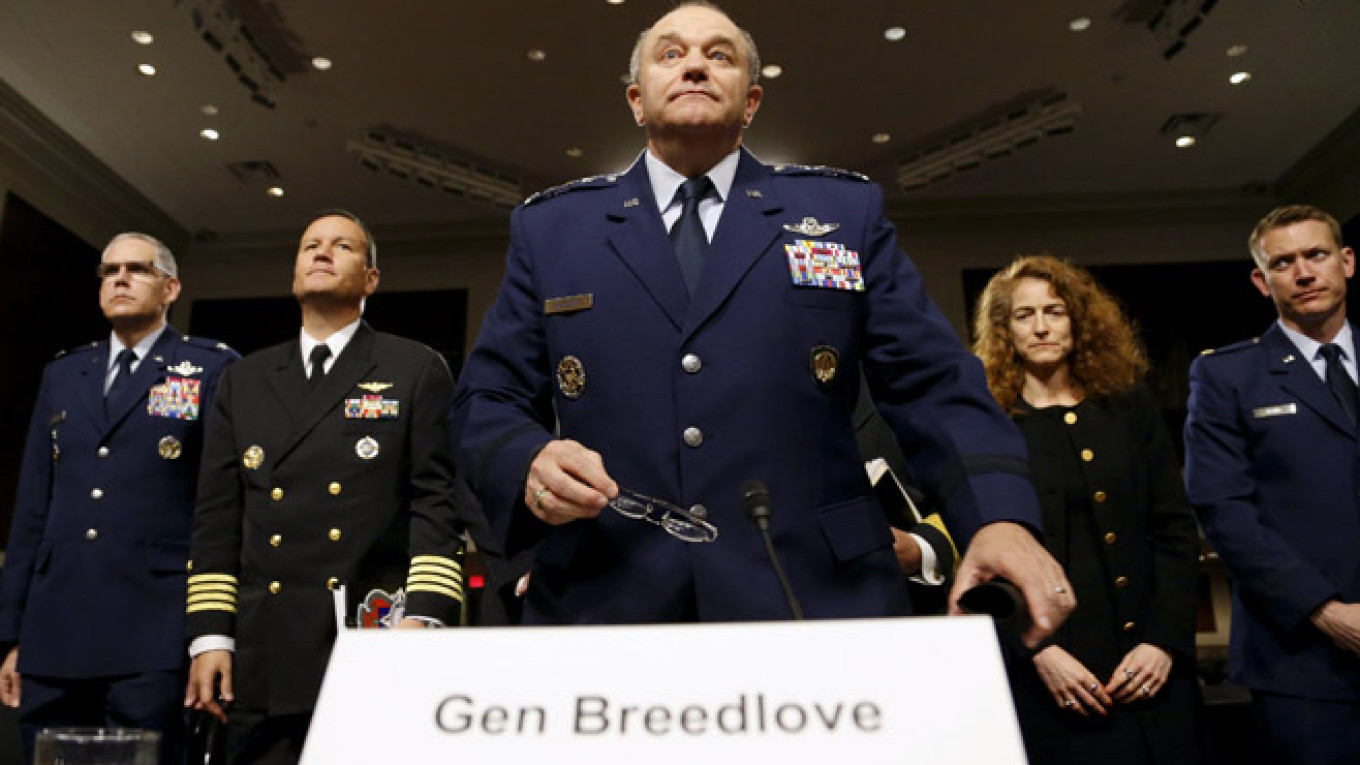ANTALYA, Turkey — NATO must pursue a long-term policy that would deter and counterbalance a resurgent Russia, which poses an "enduring and global" challenge to the alliance, Supreme Allied Commander Europe and Commander of U.S. European Command Philip Breedlove told reporters on Wednesday.
Speaking to a small group of journalists at a gathering of the NATO foreign ministers in Turkey, Breedlove said the threat posed by Russia is "not temporary."
"Russia continues to use all elements of its national power to coerce [and] influence neighboring and regional states. Moscow has developed a capable [military] force with substantial numbers of heavy weaponry to carry out its objectives," he said.
"Russia also continues to conduct snap exercises to practice and demonstrate its abilities to move significant forces quickly, creating instability through a lack of transparency," he explained.
Overall, it seemed that Breedlove and NATO view the Russia threat as genuine and on the rise. He noted that Russia's military capabilities "are growing" and the country has been carrying out significant modernization of its armed forces.
"We must strengthen our deterrent [capabilities] in order to manage these opportunistic policies," Breedlove said.
Talk of defense capabilities aside, he emphasized that in his view the Ukraine crisis cannot be resolved by brute force. "We remain convinced that the best way to bring the conflict to an acceptable lasting solution is through a political settlement, one that respects state sovereignty, territorial integrity and internationally recognized borders," he said.
In particular, he lauded the meeting in Sochi on Tuesday between Secretary of State John Kerry and President Vladimir Putin as a step in the right direction. "I think that this visit by Secretary Kerry was a very important meeting at a very important time. We do need to find a way to begin a dialogue that is useful," Breedlove said.
"Actions speak louder than words, so now it is time for all those who have come to the table … to move toward Minsk in order to find a solution in this instance and then begin to hold broader conversations. I hope that we can find a way to begin a turnaround in the disruptions in our relationship," he said.
Despite the diplomatic efforts, NATO has recorded continuous Russian military activities in eastern Ukraine and has not excluded the prospect of a new offensive by the pro-Russian insurgents this summer.
"During cease-fires, we see training, we see re-equipping, we see new forces, new money, organization, increased command and control. We have seen this happen during the whole period of cease-fire," he told journalists. "This is a new kind of war that some call a hybrid war," he said.
"In the past where there have been pauses in the fighting or temporary cease-fires or religious holidays, what we have seen on the east side of the line of contact is all kinds of preparation, training, positioning, re-provisioning, meaning moving supplies, moving air defense capabilities, increasing command and control structures. Several times after that, we saw an ambush," he added.
Breedlove also referred to Putin's recent remark about Russia's willingness to put its nuclear forces on high combat alert during the events surrounding Moscow's annexation of Crimea from Ukraine. On Sunday, March 15, state-run television channel Rossia-1 aired "Crimea: The Path to the Motherland," a documentary on the annexation that featured a never-before-seen interview with Putin. When asked if the Kremlin was ready amid the Crimea crisis to place Russia's nuclear forces on alert, Putin answered: "We were ready to do that."
With regard to the statement, Breedlove said on Wednesday, "I do believe that these remarks were put out for a purpose — to send a message. I think they were put out there to give us pause in our decision-making."
At the same time, it appears as though the NATO leadership has been listening closely to everything said by their Russian counterparts.
"I take everything that Russians say seriously and several of these remarks [about nuclear forces] were made by serious people in their government," Breedlove concluded.
Contact the author at i.nechepurenko@imedia.ru
A Message from The Moscow Times:
Dear readers,
We are facing unprecedented challenges. Russia's Prosecutor General's Office has designated The Moscow Times as an "undesirable" organization, criminalizing our work and putting our staff at risk of prosecution. This follows our earlier unjust labeling as a "foreign agent."
These actions are direct attempts to silence independent journalism in Russia. The authorities claim our work "discredits the decisions of the Russian leadership." We see things differently: we strive to provide accurate, unbiased reporting on Russia.
We, the journalists of The Moscow Times, refuse to be silenced. But to continue our work, we need your help.
Your support, no matter how small, makes a world of difference. If you can, please support us monthly starting from just $2. It's quick to set up, and every contribution makes a significant impact.
By supporting The Moscow Times, you're defending open, independent journalism in the face of repression. Thank you for standing with us.
Remind me later.


